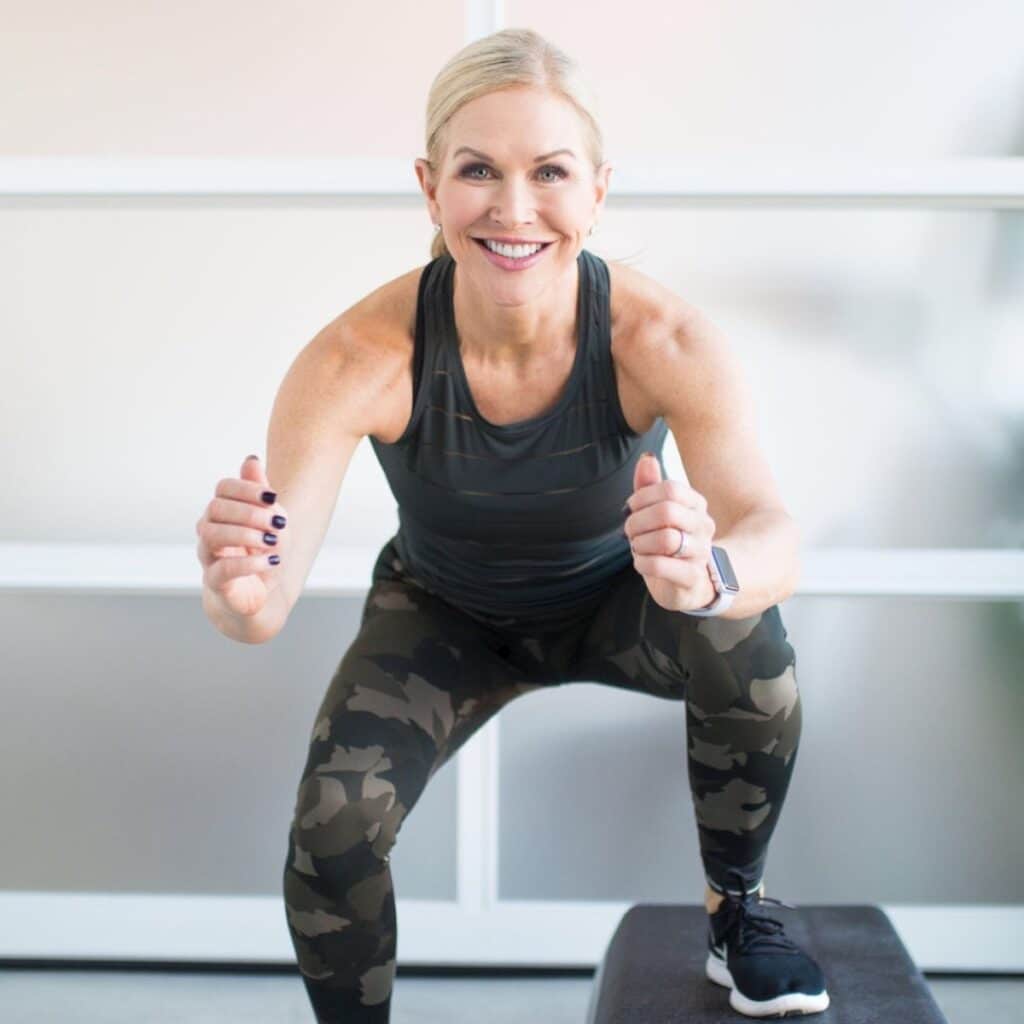This post contains affiliate links. Please see our disclosure policy.
Incorporating a weighted vest into your walking routine will introduce a new level of exercise intensity while providing health benefits like improving bone density and posture as well!
Walking is one of the most accessible and effective ways to maintain fitness, enhance cardiovascular health, and improve mental well-being. I walk almost every day, and I truly love it.
If you love walking like me…listen up. Adding a weighted vest to your routine might be the little boost you didn’t know you were looking for!
This simple addition can offer significant benefits, especially for women over 40, health-conscious individuals, and fitness enthusiasts. Does building bone density and muscle strength while improving balance and heart health sound good to you? Keep reading!
Wearing a weighted vest is a proven tactic for burning more fat while walking. It’s a great way to up the calorie burn without having to break into a jog.
I’m going to share the benefits of using a weighted vest, how to choose the right one, and tips for incorporating it safely into your walking routine.

Save This Article To Read Later
What Is A Weighted Vest And Why Should You Use One?
A weighted vest is a fitness accessory designed to add resistance to your regular activities, such as walking, running, or bodyweight exercises. The added weight forces your muscles to work harder, leading to increased strength, endurance, and calorie burn.
For us ladies in our perimenopausal and menopausal years, a weighted vest provides a simple yet effective way to enhance your walking workouts for weight loss without the need for additional equipment or complicated routines.
This is a different concept than rucking which is typically about wearing the weight on your back. A weighted vest distributes the weight across your upper body making it more comfortable.
Weighted vests comes in various styles and weights. You’ll want to find one that fits your body and works within your budget. Keep reading for more tips on choosing the right weighted vest for walking!
The Benefits Of Wearing A Weighted Vest for Walking
As someone who’s had to back off from running because of knee, hip, and back issues, I totally get the desire to still challenge yourself while staying safe. That’s where a weighted vest comes in—it’s a simple yet powerful way to up the intensity of your walks. By adding extra weight, your body has to work harder, which means you burn more calories and engage more muscle groups without the high-impact stress that comes with running. It’s a way to turn a regular walk into more of a strength workout, helping to build bone density and preserve muscle mass, both of which are crucial as we age.
Walking comes with tons of great benefits like boosting your cardiovascular health and enhancing your mental well-being. But, if you’re looking to up the ante and make your walks even more effective, a weighted vest might just be your new best friend. (Read my personal experience and how I’ve been incorporating the vest into my routine below.)
Here’s why you should consider using a weighted vest for your next walk:
Improves Bone Density
Just as weight training helps strengthen your bones, walking with a weighted vest can contribute to better bone health. This is especially important as we age and naturally start to lose bone density.
It’s a great way to help prevent osteoporosis and keep your bones strong, which is a biggie!
Builds Muscle Strength and Endurance
Carrying extra the extra weight from your vest engages more muscles, particularly in your legs, back, and core. Over time, this can lead to improved muscle tone and endurance.
You’ll notice a difference in how strong and stable you feel during your daily activities.
Boosts Calorie Burn
Adding extra weight means your body has to expend more energy to move, which translates to burning more calories. Whether you’re looking to lose weight or maintain your current fitness level, a weighted vest can help accelerate your progress.
Combine your weighted vest with an interval walking training workout for an even bigger boost!
Enhances Cardiovascular Health
The additional resistance of a weighted vest challenges your cardiovascular system more than regular walking. This can improve your heart health and increase your stamina over time.
It’s like turning your leisurely walk into a moderate-intensity workout without changing your pace.
Enhances Posture and Balance
A weighted vest encourages you to maintain an upright posture and engage your core muscles. This can lead to better balance and reduced risk of falls, which is crucial for overall mobility and health as we age.
You can also check out my exercises to improve balance, and my favorite mobility exercises to feel young at any age!
How to Choose the Right Weighted Vest
Choosing the right weighted vest will help increase the intensity of your walking workout without causing any discomfort or pain. Let’s take a look at fit, weight, and material!
Comfort is Key
When selecting a weighted vest, it’s crucial to prioritize comfort. Look for a vest that fits snugly but isn’t too tight, allowing you to move freely without discomfort.
The one I wear has adjustable straps to customize it to my body.
A well-fitted vest will ensure that the weight is evenly distributed across your body, preventing any strain or injury.
Choosing The Right Weight
When it comes to selecting the right weight for a weighted vest to wear while walking, it’s all about striking a balance between comfort and challenge.
Start by considering your current fitness level and experience with weight training. A good rule of thumb is to begin with a vest that is 5-10% of your body weight. For example, if you weigh 150 pounds, a vest weighing between 7.5 to 15 pounds would be a suitable starting point.
Make sure the vest fits snugly and distributes the weight evenly across your torso, preventing any undue strain on your shoulders or back.
Begin with shorter walks to get accustomed to the additional load, gradually increasing the duration as your body adapts. Always listen to your body and adjust the weight as needed to ensure that the added resistance enhances your workout without causing discomfort or injury.
Remember, the goal is to enhance your walk, not to turn it into an arduous task.
Material Matters
The material of the vest is another important consideration. Look for a vest made from durable, breathable materials that can withstand regular use and provide adequate ventilation.
This will help keep you comfortable during your workouts and ensure that the vest lasts for years to come.
How to Use a Weighted Vest for Walking Safely
Use these tips to start using your weighted vest in a way that will challenge your body without causing any damage. Take it from an expert, the way you use your vest matters!
Listen To Your Body!
Pay close attention to how your body responds to the added weight. If you experience any pain or discomfort, reduce the weight or take a break.
It’s essential to listen to your body and not push yourself too hard, especially if you’re new to using a weighted vest. As I will mention below, I experimented and decided on having two vests depending on the length of my walks.
Incorporate It Gradually
Introduce the weighted vest into your routine gradually. Start by wearing it for short periods during your regular activities, such as shorter walks or doing household chores.
As you become more comfortable with the added weight, you can gradually increase the duration and intensity of your walks.
My Experience Using a Weighted Vest
I had been hearing so much about wearing a weighted vest from medical professionals that I respect, so I decided to give it a try. Wearing a weighted vest on my daily walks has given me a little boost, and mostly I know it’s doing me good for building bone density and strong muscles.
At first, I was a bit apprehensive about adding extra weight to my routine, but I quickly realized the benefits.
Not only did I feel more energized during my walks, but I also noticed an improvement in my overall strength and endurance. Plus, knowing that I’m taking steps to maintain my bone health is incredibly empowering.
I personally wear a 12-pound vest for daily walks between 2-3 miles. I start to feel it in my shoulders when I go longer. Therefore, for my longer walks and hiking I decided to also buy an 8-pound vest which is really perfect for a challenge without straining my shoulders.
This is the weighted vest I own and wear. I have it in 8 pounds and 12 pounds.
Final Thoughts
Incorporating a weighted vest into your fitness routine can offer numerous benefits, from building bone density and muscle strength to boosting calorie burn and improving balance and stability. By choosing the right vest and using it safely, you can enhance your workouts and enjoy a healthier, more active lifestyle.
Ready to take your fitness routine to the next level? Start incorporating a weighted vest into your workouts today and experience the difference for yourself.
Send me a message and let me know if you’ve hopped on this trend! I want to support you every step of the way on your wellness journey.




I added a weight vest to my walking & am slowly wearing it for workouts also. I love it! So far & I love the benefits of building strong bones even more!!
Michelle 💪🏼💜
Thank you for this article and information! I just purchased the 12 pound vest and used for my walk this morning. I love it! I noticed that my walking speed decreased, but I did not experience any increased strain or fatigue. My question is should I be aiming for more difficulty, (and therefore up the weight of the vest) or is the benefit of the weighted vest a mild to moderate increase in exertion?
Thanks so much!
Great job!! I would say for a mid size female – 12lbs is enough – Increasing your speed or exertion by adding incline, etc will help!!!
How do you feel about arm weights to use while walking? Does it provide a similar benefit as the vest?
Well – extra weight in general provides more resistance. But I like my 12 lb vest – i can feel the extra effort it requires. i would not put 12 pounds on my arms or in my hands – that would be too much to carry or move. The idea of a vest is it in on your torso so no stress to joints like wrists, elbows etc.
I weigh 125 been using 6 lbs i walk 4 miles daily. Starting tomorrow 8 lbs im 66 yo.
WOW good for you! I wear my 8 lb vest on most of my walks!